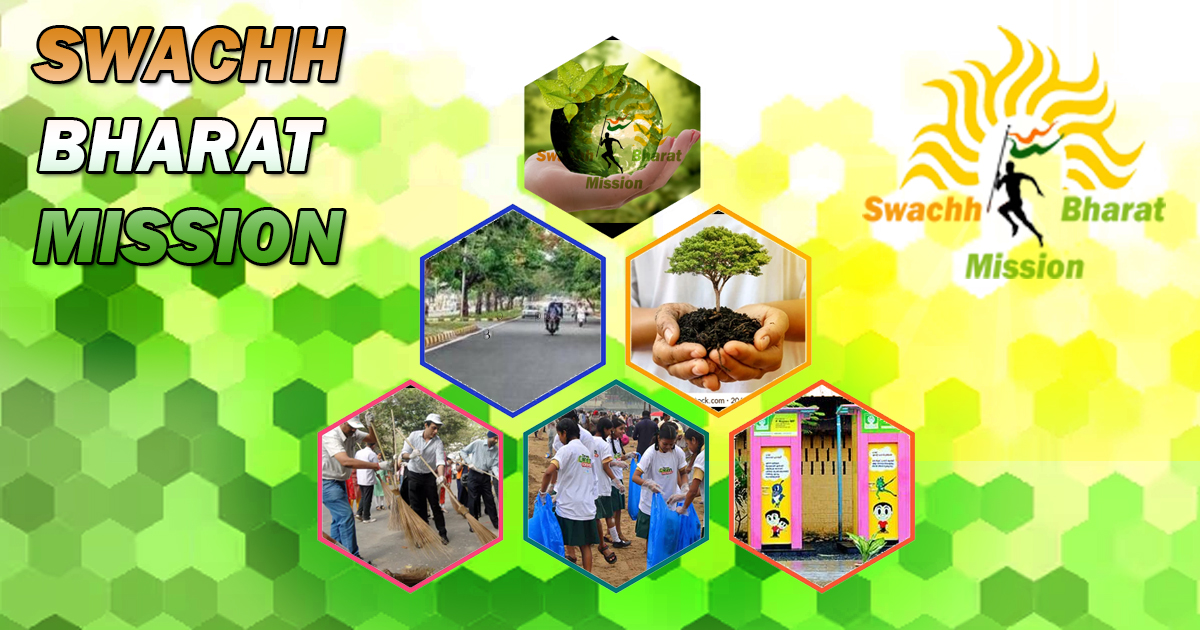Introduction:
Launched in 2014, the Swachh Bharat Mission (SBM), also known as the Clean India Mission, is a national campaign aimed at eliminating open defecation and improving overall sanitation practices in India.
Provisions and Initiatives:
The SBM is a two-pronged mission with distinct rural and urban components:
- Swachh Bharat Mission (Grameen) (SBM-G): This rural component focuses on constructing toilets in individual households and ensuring Open Defecation Free (ODF) status for villages. It emphasizes behavior change communication and community mobilization.
- Swachh Bharat Mission (Urban) (SBM-U): This urban component addresses sanitation challenges in cities through solid waste management, including waste collection, segregation, and processing. It promotes public-private partnerships and citizen participation.
Key Initiatives of the Mission:
- Construction of Toilets: SBM-G prioritizes building individual household latrines (IHHLs) with financial assistance to eligible families. It also focuses on constructing community and public toilets in areas lacking proper sanitation facilities.
- Behavior Change Communication (BCC): The mission utilizes mass media campaigns, community outreach programs, and school sanitation awareness initiatives to promote the use of toilets and hygiene practices.
- Solid Waste Management (SWM): SBM-U emphasizes source segregation of waste into biodegradable, non-biodegradable, and recyclable categories. It encourages composting, waste-to-energy plants, and material recovery facilities for better waste management.
- Capacity Building: The mission focuses on training sanitation workers, Panchayat Raj institutions, and urban local bodies (ULBs) for effective implementation and management of sanitation facilities.
Challenges Faced by the Mission:
Despite significant progress, several challenges persist:
- Sustainability of ODF Status: Ensuring long-term adherence to ODF practices and proper toilet usage requires sustained behavior change efforts.
- Waste Management Infrastructure: Limited waste collection coverage, inadequate processing facilities, and improper waste disposal in urban areas pose significant challenges.
- Financial Sustainability: Long-term financial resources are crucial for maintaining infrastructure, waste management systems, and promoting sustained behavior change.
- Social Stigma: In some rural communities, social stigma associated with manual scavenging and sanitation work continues to be a hurdle.
Sustaining the momentum of Swachh Bharat Mission requires a multi-pronged approach:
- Community Ownership: Fostering a sense of ownership among communities through participatory sanitation planning and management is vital for long-term success.
- Technological Advancements: Utilizing innovative technologies for waste collection, segregation, and processing can improve efficiency and waste management outcomes.
- Financial Sustainability: Exploring public-private partnerships, user fees, and innovative financing mechanisms can ensure continued resource mobilization.
- Skilling and Uplifting Sanitation Workers: Investing in training and skill development for sanitation workers, alongside addressing social stigma linked to their profession, is crucial.
The Swachh Bharat Mission has made significant strides in improving sanitation and hygiene practices in India. By addressing the existing challenges, fostering community ownership, and embracing technological advancements, the mission can ensure a clean and healthy future for all citizens.
 Chinmaya IAS Academy – Current Affairs Chinmaya IAS Academy – Current Affairs
Chinmaya IAS Academy – Current Affairs Chinmaya IAS Academy – Current Affairs

